
Studies in Language Assessment
Scope & Guideline
Exploring innovative methodologies in language assessment.
Introduction
Aims and Scopes
- Language Proficiency and Economic Impact:
Research exploring the relationship between language proficiency, particularly English, and socio-economic factors such as employability and income. - Innovative Assessment Practices:
Studies focusing on new methodologies and frameworks in language assessment, including learning-oriented and automated assessment techniques. - Validity and Fairness in Assessment:
Investigations into the validity of assessments, including the development and evaluation of assessment tools and frameworks to ensure fairness across diverse learner populations. - Culturally Responsive Assessment:
Research emphasizing the integration of cultural considerations in assessment practices, particularly for indigenous and multilingual communities. - Teacher Assessment Literacy:
Exploration of the knowledge, skills, and practices of educators in language assessment, including the impact of professional development on assessment literacy. - Technology in Language Assessment:
Studies examining the role of technology, such as remote proctoring and automated scoring systems, in language assessment.
Trending and Emerging
- Impact of Socio-Economic Factors on Language Proficiency:
Recent studies have increasingly focused on how language proficiency, particularly in English, correlates with socio-economic outcomes, highlighting the significance of language skills in the job market. - Learning-Oriented Language Assessment:
A growing emphasis on assessment practices that support learning rather than merely measuring it, indicating a shift towards formative assessment approaches. - Culturally Responsive and Inclusive Assessment Practices:
An emerging trend towards assessments that are sensitive to cultural contexts and inclusive of diverse learner populations, particularly indigenous and multilingual students. - Technology-Enhanced Assessment:
The integration of technology in assessment, including remote proctoring and automated scoring systems, is a rapidly growing area of research, reflecting the impact of digital transformation in education. - Teacher Training and Assessment Literacy:
There is an increasing focus on the professional development of teachers in the realm of assessment literacy, emphasizing the importance of equipping educators with the necessary skills to conduct fair and effective assessments.
Declining or Waning
- Traditional Assessment Methods:
There is a noticeable decrease in research focused on conventional assessment methods, suggesting a shift towards more innovative and adaptive assessment approaches. - General Language Assessment Frameworks:
Interest in broad, generic assessment frameworks appears to be waning, with researchers increasingly focusing on context-specific and culturally responsive frameworks. - Standardized Testing Critiques:
While critiques of standardized testing were once a significant theme, recent publications indicate a decline in this focus, possibly due to a growing emphasis on alternative assessment methods. - Quantitative Analysis of Language Proficiency:
There seems to be a reduction in purely quantitative studies measuring language proficiency, as qualitative insights and mixed-method approaches gain prominence.
Similar Journals
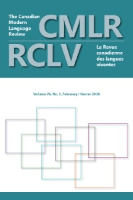
CANADIAN MODERN LANGUAGE REVIEW-REVUE CANADIENNE DES LANGUES VIVANTES
Fostering Academic Excellence in Language StudiesCanadian Modern Language Review - Revue Canadienne des Langues Vivantes is a leading scholarly journal published by University of Toronto Press Inc, focused on the field of linguistics and language education. With its ISBN 0008-4506 and E-ISBN 1710-1131, this journal has established itself as a significant contributor to research in both the education and linguistics categories, currently holding a Q3 classification in Education and a Q2 in Linguistics and Language as of 2023. It boasts an impressive Scopus rank within the top percentiles for both fields, ensuring its validity and relevance among contemporary academic discourse. The journal's emphasis on publishing high-quality research aims to advance understanding and promote effective pedagogical practices, making it an essential resource for researchers, educators, and students passionate about modern languages. The Canadian Modern Language Review has been active from 1996 to 2024, facilitating discussions that bridge linguistic theory and educational practices, although it maintains a subscription-based access approach. Situated in Toronto, Canada, at the Journals Division, 5201 Dufferin St, Downsview, ON M3H 5T8, this journal invites contributions that explore innovative methodologies and critical issues in the field, fostering an environment of academic rigor and collaboration.
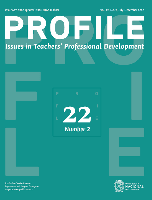
Profile-Issues in Teachers Professional Development
Elevating Standards: Research-Driven Approaches to Teacher TrainingProfile - Issues in Teachers Professional Development is a distinguished open access journal published by the Universidad Nacional de Colombia, Facultad Ciencias Humanas, aimed at fostering research and discourse surrounding critical issues in educators' ongoing professional development. Since its inception in 2005, the journal has established itself as a significant resource within the fields of Education and Linguistics and Language, reflecting its relevance through its category quartiles, being positioned in Q3 in Education and an impressive Q1 in Linguistics and Language for 2023. The journal boasts a commendable Scopus ranking, reflecting its impact and commitment to advancing scholarly discussion, with rankings of #236 out of 1167 in Linguistics and Language, and #818 out of 1543 in Education. With a converged timeline from 2018 to 2024, it serves as a vital platform for educators, researchers, and students alike, encouraging the dissemination of innovative practices and insights essential for the evolution of teacher training and professional growth in a rapidly changing educational landscape.
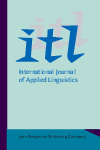
ITL-International Journal of Applied Linguistics
Elevating academic dialogue in the realm of applied linguistics.ITL-International Journal of Applied Linguistics, published by JOHN BENJAMINS PUBLISHING CO in Belgium, stands as a leading journal in the field of applied linguistics and education, recognized for its rigorous scholarship and impactful contributions. With an impressive ranking of Q1 in both the Education and Linguistics and Language categories, ITL holds its place among the top journals globally, featuring in the Scopus rankings with a notable 91st percentile in both Arts and Humanities as well as Social Sciences. The journal aims to disseminate innovative research exploring the intersection of linguistics, language acquisition, and pedagogical practices, fostering a rich academic dialogue among researchers, educators, and practitioners. Though not currently an open access journal, ITL remains accessible to a broad readership, with an emphasis on high-quality, peer-reviewed articles that inform and inspire advancements in applied linguistics. The journal's commitment to academic excellence and relevance makes it an essential resource for those seeking to understand and contribute to the dynamic landscape of language studies.

English Teaching and Learning
Pioneering Strategies for Effective English Language InstructionEnglish Teaching and Learning is a distinguished academic journal published by SPRINGER SINGAPORE PTE LTD, focusing on the dynamic fields of education and linguistics. With an ISSN of 1023-7267 and an E-ISSN of 2522-8560, this journal serves as a vital platform for researchers, educators, and practitioners interested in advancing the understanding of English language instruction and learning methodologies. Recognized for its high standards, it has achieved a notable Q2 ranking in Education and a prestigious Q1 ranking in Linguistics and Language in 2023, underscoring its impact within these essential scholarly fields. The journal, which spans a converged publication period from 2015 to 2024, endeavors to disseminate innovative research, theoretical insights, and practical applications, making it an invaluable resource for anyone committed to enhancing English education globally. Although it does not operate under an open-access model, its contributions are pivotal in shaping contemporary discourse in English teaching and learning.
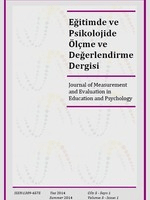
Journal of Measurement and Evaluation in Education and Psychology-EPOD
Pioneering Research for Enhanced Learning Outcomes.Journal of Measurement and Evaluation in Education and Psychology-EPOD is a distinguished open-access journal published by the ASSOCIATION FOR MEASUREMENT & EVALUATION IN EDUCATION & PSYCHOLOGY since 2010, based in Ankara, Turkey. Focusing on the critical intersections of education and psychology, this journal aims to disseminate valuable research that enhances assessments and evaluation methodologies across diverse educational settings. With a commitment to advancing knowledge, it explores a broad range of topics pertaining to developmental and educational psychology, making it an essential resource for researchers, professionals, and students alike. Despite its recent challenges, highlighted by its Q4 categorization in both Developmental and Educational Psychology and Education, the journal continues to provide a platform for innovative ideas and discussions crucial to shaping future educational practices. Access the latest findings and contribute to the field through this vital scholarly outlet.
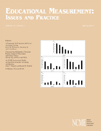
Educational Measurement-Issues and Practice
Innovating Practices in Educational Measurement.Educational Measurement-Issues and Practice, published by WILEY, stands as a premier journal in the field of education, recognized for its commitment to advancing understanding of measurement issues and methodologies in educational contexts. Established in 1982, this journal spans over four decades of scholarly contributions, maintaining a remarkable Q1 status within the Education category as per the 2023 metrics, and ranking #407 out of 1543 in Scopus's Education domain, placing it in the top 73rd percentile. It features a range of articles that address critical issues concerning educational assessment practices, policy implications, and innovative measurement methodologies, aimed at professionals, researchers, and students dedicated to enhancing educational assessment frameworks. With its ongoing focus on contemporary challenges and developments in the field, Educational Measurement-Issues and Practice plays a crucial role in shaping effective educational policies and practices worldwide, making it an essential resource for anyone involved in educational research and measurement.
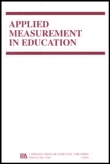
APPLIED MEASUREMENT IN EDUCATION
Empowering educators with cutting-edge assessment insights.Applied Measurement in Education is a prestigious journal published by Routledge Journals, Taylor & Francis Ltd, dedicated to advancing the fields of education and developmental psychology. Established in 1988, the journal has played a critical role in disseminating research and theoretical perspectives related to assessment, measurement practices, and educational outcomes. With an impressive standing in the academic community, it is categorized in the Q2 quartile for Developmental and Educational Psychology and the Q1 quartile for Education as of 2023. It ranks #654 out of 1543 in Social Sciences - Education and #203 out of 360 in Psychology - Developmental and Educational Psychology. Though not an Open Access journal, it provides essential insights for educators and policymakers wishing to harness measurement tools for improved educational practice. With a focus on empirical research, theoretical frameworks, and practical applications, Applied Measurement in Education serves as a vital resource for researchers, professionals, and students dedicated to enhancing the effectiveness and fairness of educational assessments.
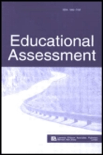
Educational Assessment
Driving Change in Assessment MethodologiesEducational Assessment is a prestigious journal dedicated to the latest advancements and research in the field of education, with a particular focus on the evaluation and assessment practices that shape educational policies and student outcomes. Published by Routledge Journals, Taylor & Francis Ltd, this influential journal boasts an impressive Q1 rating in Education for 2023, highlighting its critical role in disseminating high-quality research. With an ISSN of 1062-7197 and an E-ISSN of 1532-6977, Educational Assessment has been a vital resource for scholars and practitioners since its inception, spanning from 1993 to 1995 and again from 2004 to 2024. Researchers in this field can utilize findings published in this journal to inform best practices, influence pedagogical techniques, and drive improvements in assessment methodologies. Although it is not an Open Access journal, Educational Assessment is recognized for its rigorous peer-review process and valuable contributions to the education landscape, making it an essential read for anyone interested in educational research and assessment strategies.
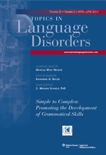
TOPICS IN LANGUAGE DISORDERS
Exploring the complexities of language pathology.TOPICS IN LANGUAGE DISORDERS is a premier academic journal published by LIPPINCOTT WILLIAMS & WILKINS that has been at the forefront of research in linguistics and communication sciences since 1980. Issued in both print (ISSN: 0271-8294) and electronic formats (E-ISSN: 1550-3259), this journal caters to an audience of researchers, clinicians, and students dedicated to understanding and addressing language disorders. With a notable impact factor and categorized in Q1 for Linguistics and Language and Q2 for Speech and Hearing in 2023, it occupies a vital niche in the scholarly discourse around language pathology, presenting rigorously peer-reviewed articles that advance knowledge and practice in the field. Although it is not an open access journal, subscribers benefit from in-depth studies, comprehensive reviews, and case analyses that drive innovation and inform evidence-based interventions. The journal aims to bridge theoretical insights and practical applications, making it an essential resource for professionals seeking to enhance their understanding of communication disorders and develop effective treatment strategies. Positioned in Philadelphia, PA, the journal continues to influence the landscape of language research, maintaining a critical role in nurturing the academic pursuit of excellence in language disorder studies.
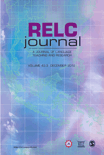
RELC Journal
Advancing Knowledge in Education and LinguisticsRELC Journal, published by SAGE Publications Ltd, stands as a leading platform in the fields of Education and Linguistics, boasting an impressive Q1 ranking in both categories according to the latest metrics. Established in 1970 and continuing its commitment to academic excellence through 2024, the journal features rigorous peer-reviewed research that explores the intersections of language, culture, and pedagogy. With a notable Scopus ranking that places it in the 98th percentile for both Language and Linguistics (Rank #16/1088) and Education (Rank #91/1543), the RELC Journal is essential for scholars, educators, and practitioners seeking to contribute to and stay abreast of cutting-edge developments in their respective fields. Although currently not open access, the journal remains accessible to a diverse audience and invites contributions that challenge conventional perspectives and inspire innovative practices in language education.